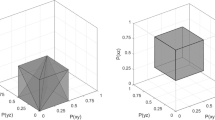Abstract
It is not unusual in real-life that one has to choose among finitely many alternatives when the merit of each alternative is not perfectly known. Instead of observing the actual utilities of the alternatives at hand, one typically observes more or less precise signals that are positively correlated with these utilities. In addition, the decision-maker may, at some cost or disutility of effort, choose to increase the precision of these signals, for example by way of a careful study or the hiring of expertise. We here develop a model of such decision problems. We begin by showing that a version of the monotone likelihood-ratio property is sufficient, and also essentially necessary, for the optimality of the heuristic decision rule to always choose the alternative with the highest signal. Second, we show that it is not always advantageous to face alternatives with higher utilities, a non-monotonicity result that holds even if the decision-maker optimally chooses the signal precision. We finally establish an operational first-order condition for the optimal precision level in a canonical class of decision-problems, and we show that the optimal precision level may be discontinuous in the precision cost.
Similar content being viewed by others
References
Ben-Akiva M., Lerman S.R. (1985) Discrete Choice Analysis; Theory and Application to Travel Demand. MIT Press, Cambridge, MA
Chade H., Schlee E. (2002) Another look at the Radner-Stiglitz nonconcavity in the value of information. Journal of Economic Theory 107: 421–452
Debreu G. (1959) Theory of Value. Yale University Press, New Haven
Karlin S., Rubin H. (1956) The theory of decision procedures for distributions with monotone likelihood ratio. Annals of Mathematical Statistics 27: 272–299
Kihlstrom R. (1974a) A Bayesian model of demand for information about product quality. International Economic Review 15: 99–118
Kihlstrom R. (1974b) A general theory of demand for information about product quality. Journal of Economic Theory 8: 413–439
Lehmann, E. (1997), Testing Statistical Hypotheses, Springer Verlag: Berlin (2nd ed.).
Lindgren B. (1968) Statistical Theory. Toronto, Macmillan
McFadden D. (1973) Conditional logit analysis of qualitative choice behavior. In: Zaremka P. (eds). Frontiers in Econometrics. Academic Press, New York, pp. 105–142
Milgrom P. (1981) Good news and bad news: Representation theorems and applications. Bell Journal of Economics 12: 380–391
Mirrlees, J. (1987), Economic Policy and Nonrational Behaviour, WP 8728, University of California at Berkeley.
Radner, R. and Stiglitz, J. (1984), A nonconcavity in the value of information, in Boyer, M. and Kihlstrom, R.E. (eds.), Bayesian Models in Economic Theory. North-Holland: Amsterdam, pp. 33–52.
Sheshinski, E. (2002), Bounded Rationality and Socially Optimal Limits on Choice in a Self-Selection Model, Department of Economics, Hebrew University of Jerusalem.
Sheshinski, E. (2003), Optimal Policy to Influence Individual Choice Probabilities, Department of Economics, Hebrew University of Jerusalem.
Simon C.P., Blume L. (1994) Mathematics for Economists. Norton: New York
Vega-Redondo F. (1993) Simple and inertial behavior: an optimizing decision model with imprecise perceptions. Economic Theory 3: 87–98
Author information
Authors and Affiliations
Corresponding author
Rights and permissions
About this article
Cite this article
Weibull, J.W., Mattsson, LG. & Voorneveld, M. Better May be Worse: Some Monotonicity Results and Paradoxes in Discrete Choice Under Uncertainty. Theor Decis 63, 121–151 (2007). https://doi.org/10.1007/s11238-007-9041-7
Received:
Accepted:
Published:
Issue Date:
DOI: https://doi.org/10.1007/s11238-007-9041-7




